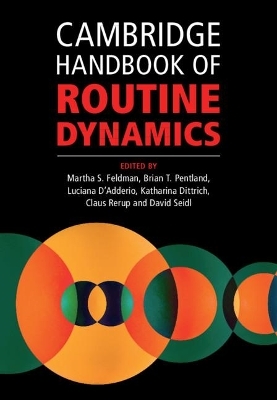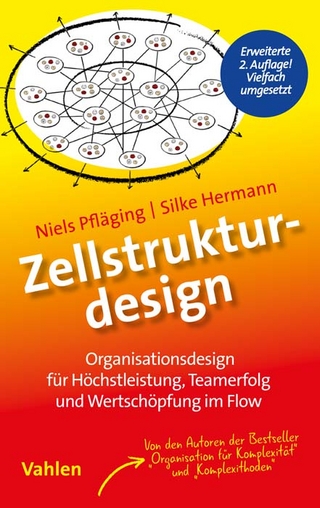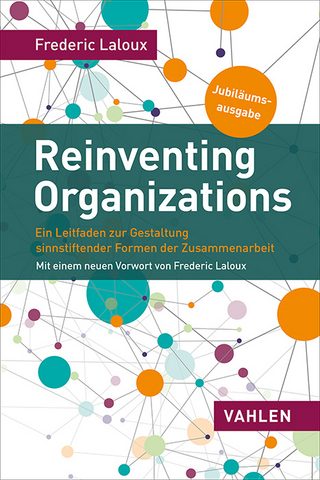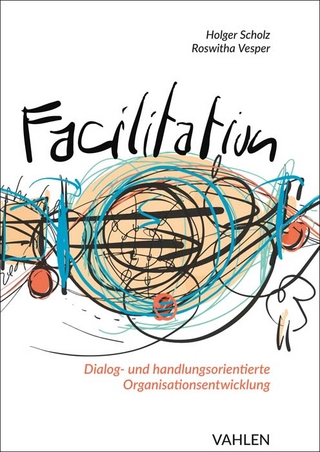
Cambridge Handbook of Routine Dynamics
Cambridge University Press (Verlag)
978-1-108-83447-6 (ISBN)
Over the last two decades, Routine Dynamics has emerged as an international research community that shares a particular approach to organizational phenomena. At the heart of this approach is an interest in examining the emergence, reproduction, replication and change of routines as recognizable patterns of actions. In contrast to other research communities interested in those phenomena, Routine Dynamics studies are informed by a distinctive set of theories (especially practice theory and related process-informed theories). This Handbook offers both an accessible introduction to core concepts and approaches in Routine Dynamics as well as a comprehensive and authoritative overview of research in different areas of Routine Dynamics. The chapters of this Handbook are structured around four core themes: 1) Theoretical resources for research on the dynamics of routines, 2) Methodological issues in studying the dynamics routines, 3) Themes in Routine Dynamics research and 4) Relation of Routine Dynamics to other communities of thought.
Martha Feldman is Professor of Urban Planning and Public Policy, Management, Political Science and Sociology, and the Johnson Chair for Civic Governance and Public Management, University of California, Irvine. Brian T. Pentland is the Main Street Capital Partners Endowed Professor in the Department of Accounting and Information Systems at Michigan State University. Luciana D'Adderio is Chancellor's Fellow in Data Driven Innovation at the University of Edinburgh. Katharina Dittrich is Associate Professor of Organisation Studies in the Organisation and Human Resource Management (OHRM) Group at Warwick Business School. Claus Rerup is a Professor of Management at the Frankfurt School of Finance and Management. David Seidl is Professor of Organization and Management at the University of Zurich.
1. What is routine dynamics Luciana D'Adderio, Katharina Dittrich, Martha S. Feldman, Brian T. Pentland, Claus Rerup and David Seidl; Part I. Theoretical Resources for Research Dynamics Research: 2. Practice theory and routine dynamics Martha S. Feldman; 3. Process theorizing and routine dynamics Haridimos Tsoukas; 4. Ethnomethodology and routine dynamics Juan López-Cotarelo; 5. Pragmatism and routine dynamics Dionysios D. Dionysiou; 6. Actor-network theory and routine dynamics Kathrin Sele; 7. Materiality and routine dynamics Luciana D'Adderio; Part II. Methodological Issues in Research Dynamics Research: 8. Ethnography and routine dynamics Katharina Dittrich; 9. Video methods and routine dynamics Curtis LeBaron and Marlys K. Christianson; 10. Field experiments in routine dynamics Hari Bapuji, Manpreet Hora and Huashan Li; 11. Agent-based modeling in routine dynamics Dehua Gao; 12. Sequence analysis in routine dynamics Christian A. Mahringer and Brian T. Pentland; 13. Narrative networks in routine dynamics Brian T. Pentland and Inkyu Kim; 14. Bakhtin's chronotope and routine dynamics Simon Addyman; Part III. Themes in Routine Dynamics Research: 15. Truces and routine dynamics Luciana D'Adderio and Mehdi Safavi; 16. Context, embeddedness and routine dynamics Jennifer Howard-Grenville and Jan Lodge; 17. Routine interdependence: intersections, clusters, ecologies and bundles Rodrigo A. Rosa, Waldemar Kremser and Sergio Bulgacov; 18. Cognition in routine dynamics Nathalie Lazaric; 19. Time, temporality and history in routine dynamics Scott F. Turner and Violina P. Rindova; 20. Transfer and replication in routine dynamics Charlotte Blanche and Patrick Cohendet; 21. Innovation work and routine dynamics Fleur Deken and Kathrin Sele; 22. Design and routine dynamics Frithjof E. Wegener and Vern L. Glaser; 23. Algorithms and routine dynamics Vern L. Glaser, Rodrigo Valadao and Timothy R. Hannigan; 24. Complexity in routine dynamics Thorvald Hærem, Yooeun Jeong and Mathias Hansson; 25. Bodies and routine dynamics Charlotte Blanche and Martha S. Feldman; 26. Emotion and routine dynamics Giada Baldessarelli; 27. Professional identity and routine dynamics Emre Karali; 28. Occupations, professions and routine dynamics Joanna Kho and Paul Spee; 29. Management practice and routine dynamics Simon Grand; 30. Project-based and temporary organizing and routine dynamics Eugenia Cacciatori and Andrea Prencipe; 31. Self-managed forms of organizing and routine dynamics Waldemar Kremser and Jun Xiao; 32. Unexpected events and routine dynamics Daniel Geiger and Anja Danner-Schröder; Part IV. Related Communities of Thought: 33. Carnegie school experiential learning and routine dynamics Claus Rerup and Bryan Spencer; 34. Dynamic capabilities and routine dynamics Carlo Salvato; 35. Strategy as practice and routine dynamics David Seidl, Benjamin Grossmann-Hensel and Paula Jarzabkowski; 36. Path dependence and routine dynamics Jörg Sydow; 37. Business process management and routine dynamics Bastian Wurm, Thomas Grisold, Jan Mendling and Jan vom Brocke; Index.
| Erscheinungsdatum | 01.11.2021 |
|---|---|
| Zusatzinfo | Worked examples or Exercises |
| Verlagsort | Cambridge |
| Sprache | englisch |
| Maße | 175 x 251 mm |
| Gewicht | 1160 g |
| Themenwelt | Wirtschaft ► Betriebswirtschaft / Management ► Planung / Organisation |
| Wirtschaft ► Betriebswirtschaft / Management ► Unternehmensführung / Management | |
| Wirtschaft ► Volkswirtschaftslehre ► Mikroökonomie | |
| ISBN-10 | 1-108-83447-7 / 1108834477 |
| ISBN-13 | 978-1-108-83447-6 / 9781108834476 |
| Zustand | Neuware |
| Informationen gemäß Produktsicherheitsverordnung (GPSR) | |
| Haben Sie eine Frage zum Produkt? |
aus dem Bereich


